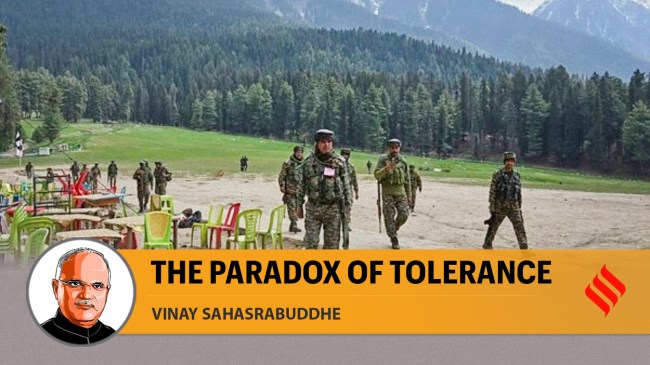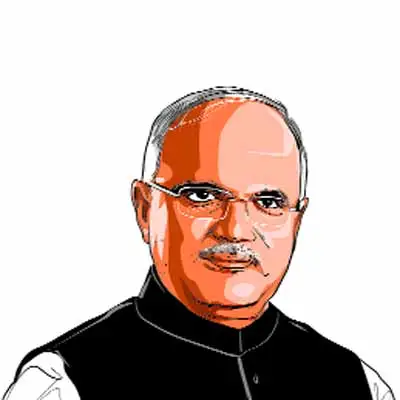Opinion Pahalgam attack: Not punishing the guilty amounts to punishing the innocent
Neither cowardice nor a myopic approach while meeting the challenge of terrorism is likely to lead us to a permanent solution.
 In a deadly terrorist attack on April 22 in Pahalgam, a marquee tourist spot in Jammu and Kashmir, 26 people were killed. (File Photo)
In a deadly terrorist attack on April 22 in Pahalgam, a marquee tourist spot in Jammu and Kashmir, 26 people were killed. (File Photo) Over time and across the world, countless people have lost their lives to terrorist attacks. Radical groups often take responsibility for such attacks and even openly justify their actions. There are three broad forms of such justification. First, doctrines like Naxalism, which claim the alleged social and economic exploitation and oppression by the so-called “establishment”. They believe that if key oppressors are eliminated, others will learn a lesson. The second group comprises terrorists who claim to be fighting to reclaim the land from where they were allegedly driven out. The third, and perhaps the most dreadful defence of terrorism that involves the killing of innocent people comes from ultra-fundamentalists. They honestly believe that people adhering to different ways of worship have no right to exist and hence, deserve to be eliminated. The Pahalgam attackers belong to this category.
The terrorists at Pahalgam sought to verify the religious beliefs of their prospective victims before pulling the trigger. This is reprehensible. While plausible solutions could be thought of for the first two forms of justification for terrorism, what was witnessed at Pahalgam represents a far more dangerous threat to humanity. To address this, the global community must collectively reject such an outlook. Mere condemnation of killings is not enough. Countries siding with terrorists who engage in attacks like the one at Pahalgam must be made to face harsh sanctions. The question is: How do we ensure this?
The global community and global governance organisations must recognise and adopt “spiritual democracy” as the fundamental principle of peaceful co-existence. Indian or Hindu culture represents the most relevant and living civilisational example of spiritual democracy. Europe is still struggling to cope with what it calls multiculturalism. As against this, India has stood out as an example of unity in diversity for several centuries. The foundation of this spiritual democracy is so strong that even invaders could not impose their belief system and convert a sizeable section of the country’s population.
However, there is a catch. Accepting others is our natural instinct. But this spirit can be sustained only when others also accept us. While we can relish the goodness of our culture, we must make the global community realise that a monopolistic approach in spiritual matters and ideas of the supremacy of a race will always — as they have in the past — shatter peace. The desire for co-existence is necessary for it to succeed. Co-existence also demands that every section enjoys equality of security, opportunity and dignity.
The message is clear: Those who don’t accommodate others don’t deserve to be accommodated. PM Modi’s proclamation about bringing the perpetrators to the book is along expected lines and reassuring. The war on terrorism demands that we don’t tolerate intolerance.
This issue is not new. In The Open Society and Its Enemies, philosopher Karl Popper put forward the idea of the “paradox of tolerance”. He argues that those genuinely tolerant can reserve the right to deny tolerance to those who not just believe in but also promote intolerance. Those preaching to Indians must try their luck with those who are stubborn, recalcitrant and pursue fanatic ideas. Remember, not punishing the guilty indirectly amounts to punishing the innocent.
For long, people have doubted the intentions of those from developed countries who claim to be “promoting democracy”. Thankfully, now, there appears to be a greater consensus on not confusing “democracy promotion” with “regime change” and accepting the use of military force to remove a regime. There is a greater realisation that this approach is counter-productive. Similarly, approaching the perpetrators of terrorism with kid gloves will be counterproductive and exact a higher cost.
The government and the people of India have some minimum expectations from the global community. India looks at the world as one family. It expects the global community to rise above the lure of political correctness and gather the courage to call a spade a spade. Neither cowardice nor a myopic approach while meeting the challenge of terrorism is likely to lead us to a permanent solution. To counter terror, creating a strong pressure of global public opinion alone can work as a deterrent. Remember, when India roared through the Pokhran-2 test in 1998, those criticising the country initially had to eventually accept the new reality.
The writer is a national executive committee member of the BJP




